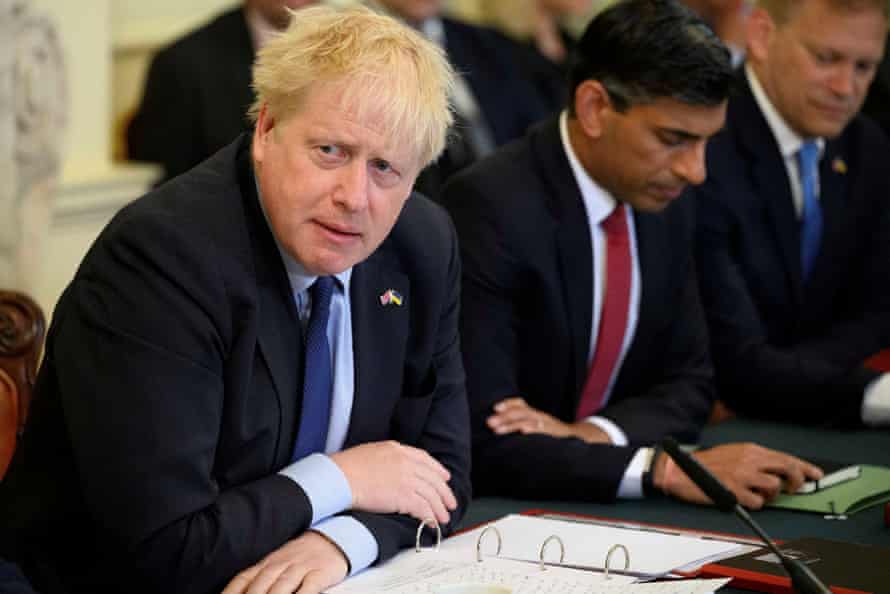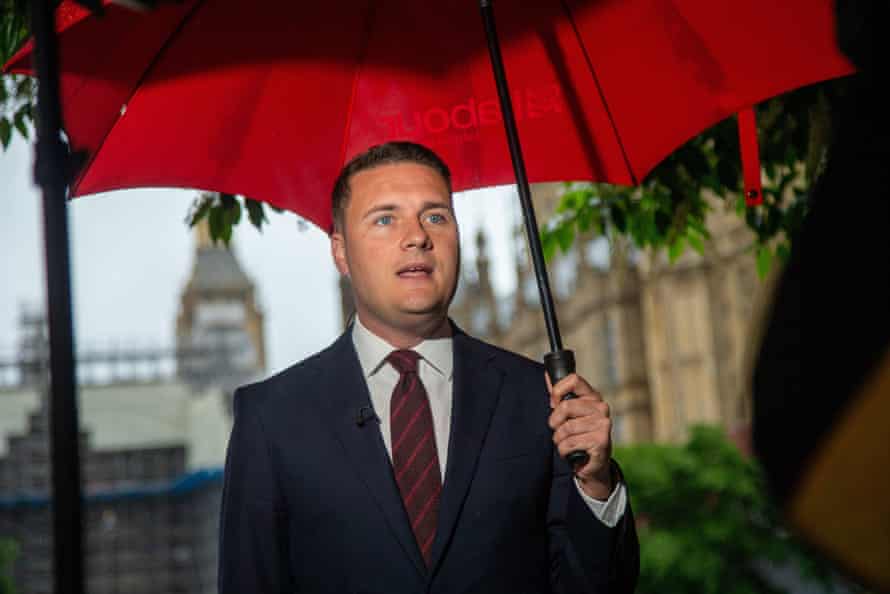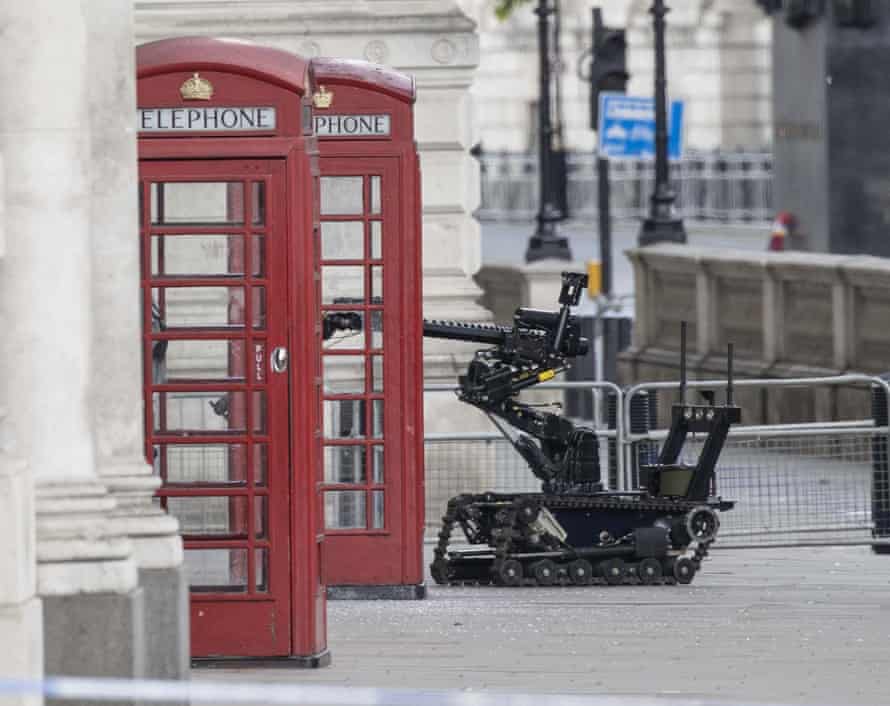
Johnson tells cabinet they can now ‘draw a line’ under Partygate and focus on issues like cutting costs of government
Boris Johnson used his opening address to cabinet this morning to seek to draw a line under Partygate. PA Media has his words, and he tried to flesh out the line in the press notice issued early this morning (see 9.41am) about how the government is now focusing on “what the people of this country care about most”. Here are the main points.
- Johnson claimed yesterday’s vote was “very important” because it meant the government could now “draw a line” under Partygate. He said:
It was a very important day because we are able now to draw a line under the issues that our opponents want to talk about and we are able to get on talking about the issues, what the issues that I think the people want … and what we are doing to help them and to take the country forward. That is what we are going to do. We are going to focus exclusively on that.
- He claimed the government had a “massive agenda” for change. He said:
We are going to get on with the massive agenda that we were elected to deliver in 2019.
It is a huge, huge thing that we are all part off, to really transform infrastructure, skills and technology, uniting and levelling up across the country, unleashing potential across the whole of the UK.
It is the totally morally, socially, economically, politically the right thing to do and we should be proud, proud, proud of what we’re doing.
- He said he wanted ministers to focus on “cutting the costs of government”. Arguing that the government was making a “huge investment” in public services, he said:
But it’s not enough just to spend money. We have got to spend it wisely.
We as Conservative ministers, we have got to make sure at every stage that we are driving reform and driving value.
So what I’m going to ask you all to do in each of your departments is make sure that you’re thinking the whole time about cutting the costs of government, about cutting the costs that business has to face and of course cutting the costs that everybody else faces, families up and down the country.
But he also said ministers should come up with ideas for public service reform too.
Over the course of the next few weeks, I’m going to ask everybody to come forward with ways in which we can, as I say, cut costs, drive reform and make sure that we understand that in the end, it is people who have the best feel for how to spend their own money rather than the government or the state.
And that is our fundamental, Conservative instinct and that way, I think we will be able to get on with our agenda, making this the most prosperous, the most successful economy in Europe.
- But he also said organisations like the Passport Office and the DVLA had to be more efficient. “I think in particular people deserve to get their passport and their driving licence just as much as they deserve to get their test, their scan or their screen on time, promptly and we’ve got to focus on that,” he said.
- He claimed the government could deliver tax cuts in the future. He said:
We will have the scope, by delivering tax cuts, I think, to deliver considerable growth in employment and economic growth.
Johnson and other ministers like talking up Tory proposals that would cut tax, but overall the tax burden has risen considerably under his premiership.

Afternoon summary
- Boris Johnson has told his cabinet that yesterday’s confidence vote was “very important” because it meant the government could now “draw a line” under Partygate. (See 11.16am.) But William Hague, the former Tory leader, used his column in the Times to say that that Johnson’s position is now untenable and that he should quit. (See 9.23am.)
- Wes Streeting, the shadow health secretary, has said the NHS cannot be “complacent” about funding and that it must show it is spending money efficiently. Speaking at an Institute for Government event, he said:
What I would say to the NHS is that we should not be complacent about the fact that healthcare spending now accounts for a huge proportion of departmental expenditure, a significant proportion of the country’s GDP.
And I think the public feel a sense of real jeopardy and anxiety about the future of the NHS, and there are siren voices on the right that have always been there who say this system is simply not sustainable and shouldn’t we look at an insurance-based model or shouldn’t we look at people paying for certain types of healthcare in addition to the ones they already pay for. I don’t think we should be complacent about that.”
As well as making the case to the Treasury for greater investment in health and social care, the thing I would say to the NHS and social care leaders is you can’t be complacent about demonstrating that you are spending that money well, and I won’t be able to be complacent about demonstrating that we’re spending that money well if I’m the secretary of state for health and social care.

Government ‘genuinely open-minded’ about future of BBC licence fee, peers told
The government is “genuinely open-minded” about the future of the BBC funding model despite Nadine Dorries’ concerns about the licence fee, culture minister Julia Lopez told the House of Lords. PA Media says:
Dorries, the culture secretary, announced earlier this year that the corporation’s licence fee will be frozen for the next two years, confirming she wants to find a new funding model before the current deal expires in 2027.
Lopez, minister for media, data, and digital infrastructure, appeared before the Lords communications committee as part of its inquiry into the future funding of the BBC.
She said: “The government is genuinely open-minded about the right model and we are seeking for somebody to survey the choices open to any government about the right way of funding the BBC and we are doing that in advancement of 2027 so that when we look at what we seek the BBC to achieve post-2027 we have a sense of how the best way of funding that will be.
“Looking at the licence fee itself, I think it is challenged by the technological revolution ….
“It is regressive that you pay the same regardless of your circumstances, it’s enforced through criminal sanctions and I know this is something [Dorries] has [been] particularly exercised about because she is concerned about conviction rates in particular for women.
“It is also quite expensive to administer …
“There is an open question as to whether it can [be replaced] and maybe government decides it can’t and while the secretary of state has made clear her own position having serious concerns about the licence fee, she also said she is open-minded to what the right model is and if the review comes back and suggests that these are the pros and cons of other models and on balance the licence fee is better, I don’t think she would entirely dismiss that.”
Sir Jeffrey Donaldson, the DUP leader, has met Keir Starmer and other MPs before the imminent publication of the government’s bill that would allow it to abandon parts of the Northern Ireland protocol. In a statement, he says he urged Starmer and other parliamentarians to understand why the DUP wants to see the protocol replaced. He said:
Real progress is only made in Northern Ireland when there is consensus, yet the protocol was foisted upon the people of Northern Ireland despite every unionist MLA and MP opposing it. It was madness to press ahead and ignore the unionist opposition. Unlike Westminster, we operate power sharing in Northern Ireland, not majority rule. Not one unionist MLA supports the protocol. That represents more than 40% of the votes cast at the recent election.
The protocol must be replaced by arrangements that restore our place within the United Kingdom and the new arrangements must command the support of unionists as well as nationalists.
Critics would say the protocol was foisted on Northern Ireland because of Brexit, which was backed by the DUP but implemented in Northern Ireland despite the fact that 56% of people in Northern Ireland voted against it.


This is from Angela Rayner, Labour’s deputy leader, on the results of the vote on her party’s ministerial code motion earlier. (See 4.24pm.)
Labour MPs voted today to adopt the recommendations of the Committee on Standards in Public Life.
We were joined by other parties in our efforts to clean up politics.
But not one single Conservative MP voted in favour. A total abdication of leadership under Boris Johnson. pic.twitter.com/4fflg8RmDE
— Angela Rayner 🌹 (@AngelaRayner) June 7, 2022
Tom Larkin at Sky News has a useful list of government ministers and PPSs who did not make statements on social media saying they would be backing Boris Johnson. This will be one to dig out when the next reshuffle takes place, to cross-reference against people getting sacked.
We’re down to 18 now – the watchful eyes of No10 pointing out that Claire Coutinho did a supportive interview on Times Radio yesterday afternoon. And Jeremy Quin made a supportive statement on his personal website (but not on his Facebook page) https://t.co/704Z3EFJ5o
— Tom Larkin (@TomLarkinSky) June 7, 2022
Sam Coates at Sky says George Freeman claims he should not be on the list (even though his public comments did not include unambiguous support for the PM).
Labour forced a division on its motion on beefing up the ministerial code (see 1.48pm), even though the government was not voting against. (You can do that by getting someone to shout “no” when the Speaker calls the vote, and putting up tellers for the no side.) The motion was passed by 215 votes to 0.
Nigel Mills, the Conservative MP for Amber Valley, told the BBC that, although he voted against Boris Johnson yesterday, he was now willing to back the government. He said:
I voted against the prime minister yesterday and I wanted to see a change made, but I accept the result that my colleagues by a majority over 60 wanted to keep the prime minister – effectively saying we should forgive the indiscretions of the lockdown period and move on.
So that I think is the right approach now for the party, the government and the country. We’ve got a lot of serious crises that need tackling, we should get behind the government to do that.

Rajeev Syal
Amid growing speculation among backbenchers that Priti Patel is distancing herself from Boris Johnson – she did not tweet her backing for the prime minister before yesterday’s confidence vote, unlike almost all other senior cabinet members – her office has today insisted that she does still give him her backing. “She is supportive of the PM as you would expect. Any suggestion to the contrary is false,” an aide said.
Allies of Patel have expressed concern that she may be moved from the Home Office in a reshuffle – a move which she would be expected to oppose.
Boris Johnson told cabinet this morning it was time to “draw a line” under Partygate. (See 11.16am.) This is what my colleague Marina Hyde has to say about this notion in her column today on the no-confidence vote.
Today’s other official angle is that last night’s horror show allows the government to “draw a line” under leadership speculation, and to stop the Tory infighting. A reminder: things we’ve done fairly recently to stop Tory infighting include having a referendum, having two general elections, and having no-confidence votes in both the past two leaders. How’s it working out for us, would you say? A significant number of the exhausted British public will feel they’ve worked harder on this relationship than their own marriages.
Still, Boris can change! He can make it work again with the voters! Settle an argument: who’s more likely to rekindle their relationship, Boris Johnson and the electorate, or Johnny Depp and Amber Heard? You’d think the latter would have a better shot at renewing their vows.
You can read Marina’s full article here.
Labour says its proposed independent integrity and ethics commission would strengthen way standards enforced for MPs
At the start of the Commons debate on the Labour motion on strengthening the ministerial code, Michael Ellis, the Cabinet Office minister, said government MPs would not be voting against. That means the motion should pass when the debate ends in the next hour or so. (See 1.48pm.)
Here are some of the other lines from the opening speeches.
- Angela Rayner, Labour’s deputy leader, accused Boris Johnson of downgrading standards in public life. Opening the debate, she said:
We all are [proud of British values], but the conduct of this prime minister undermines those values – rigging the rules that he himself is under investigation for breaching, downgrading standards, debasing the principles of public life before our very eyes.
There is nothing decent about the way that he has acted. And what example does he set? This prime minister’s example of leadership: illegally proroguing parliament, breeding a Downing Street culture where his staff felt able to break lockdown rules including himself, putting the very standards that underpin our democracy to the shredder.
It is, frankly, fake news to say, as some have, that it has been weakened. It is the exact opposite, it has been strengthened. In doing so he has unambiguously drawn on the advice of both the independent adviser on ministerial interests and the Committee on Standards in Public Life.
But Rayner said the changes announced by the prime minister did not go far enough because he had not implemented the recommendations from the Committee on Standards in Public Life in full. In a blog, cited in the debate by the Tory MP Danny Kruger, Tim Durrant from the Institute for Government thinktank said it was wrong to claim that Johnson had changed the code to stop him having to resign if he was found to have lied to parliament. But Durrant criticised the revised version of the code because it did not give the independent adviser on ministerial interests the right to initiate his own investigations, and Durrant queried other aspects of the rewrite too. He said:
Beyond the code and the role of the adviser, the most interesting part of [the] announcement is the accompanying statement from the Cabinet Office. In grandiose language, the statement sets out the government’s view that parliament can have no role whatsoever in upholding standards inside government as that would risk “conflating the executive and the legislature” …
Changes to the foreword [to the code] also removed reference to the Nolan principles (though these are embedded in the code) and the impartiality of the civil service. In the statement and foreword, Johnson and his allies effectively state that they do not believe anyone should have the right to question how they behave in office once elected.
- Rayner said Labour would set up an independent integrity and ethics commission that will beef up the way standards for politicians are enforced. She explained:
Labour’s ethics commission will bring the existing committees and bodies that oversee standards and government under a single independent body removed from politicians.
Under our new commission, we would have powers to launch investigations without ministerial approval, collect evidence and decide sanctions.
Honesty matters, integrity matters and decency matters. We should be ambitious for high standards, and we should all be accountable.
- John Penrose, the Conservative MP who resigned yesterday as the government’s anti-corruption champion, claimed that Johnson’s broke the ministerial code in his Partygate activities because, as the Sue Gray report argued, he did not show leadership – one of the seven Nolan principles for integrity in public life required under the code. In response, Ellis did not accept that. The fact that Johnson broke the rules inadvertently was a factor, he said. (Ellis seemed to think Penrose was referring to Johnson being fined, but Penrose was talking about wider failures of leadership exposed by Partygate.)
- Rayner criticised claims by ministers that it was now time to move on from Partygate. She explained:
I have heard ministers on the media in the last 24 hours talking about how we must draw a line, how we must move on. But many people in this country cannot draw a line, cannot move on whilst this prime minister is in office, because it triggers them and what they experienced and the trauma that their family faced during the crisis.
Former Brexit minister Lord Frost urges Johnson to cut taxes
Lord Frost, the former Brexit minister, told Radio 4’s World at One that he thought the government’s main problem was that it was not following Conservative principles, particularly on tax and the economy. He said:
Economic policy has drifted away from where the core of supporters, voters and membership want to go and we need to get back to it. And I believe that the prime minister would like to do that.
This prime minister is always best when he trusts his instincts and does unconventional things. And that’s what got us through the Brexit negotiations.
Frost also said that the government should reverse the increase in national insurance. Asked if he favoured abandoning the increase, he replied:
Yes – I think that all tax rises that we brought in and the corporation tax ones that are due to come in soon ought to be reversed. It is not Conservative to be raising taxes, and it is undermining growth and prosperity. We need to improve productivity and investment, and not weaken it …
I don’t think it’s a particularly good solution to the social care problem, and I don’t think much of the money will end up going to it anyway.
I think the choice at the moment is, do we prioritise the deficit or the debt or do we prioritise growth and getting the economy going again, and I think for the time being we should be prioritising growth.
When Frost resigned as Brexit minister in December, he said he was because he was unhappy with the direction of government policy in a range of areas.


